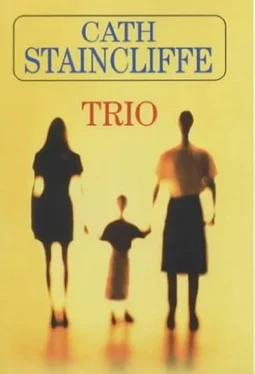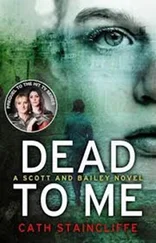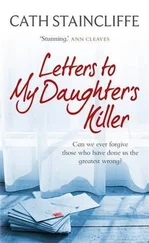Cath Staincliffe - Trio
Здесь есть возможность читать онлайн «Cath Staincliffe - Trio» весь текст электронной книги совершенно бесплатно (целиком полную версию без сокращений). В некоторых случаях можно слушать аудио, скачать через торрент в формате fb2 и присутствует краткое содержание. Жанр: Детектив, на английском языке. Описание произведения, (предисловие) а так же отзывы посетителей доступны на портале библиотеки ЛибКат.
- Название:Trio
- Автор:
- Жанр:
- Год:неизвестен
- ISBN:нет данных
- Рейтинг книги:4 / 5. Голосов: 1
-
Избранное:Добавить в избранное
- Отзывы:
-
Ваша оценка:
- 80
- 1
- 2
- 3
- 4
- 5
Trio: краткое содержание, описание и аннотация
Предлагаем к чтению аннотацию, описание, краткое содержание или предисловие (зависит от того, что написал сам автор книги «Trio»). Если вы не нашли необходимую информацию о книге — напишите в комментариях, мы постараемся отыскать её.
Trio — читать онлайн бесплатно полную книгу (весь текст) целиком
Ниже представлен текст книги, разбитый по страницам. Система сохранения места последней прочитанной страницы, позволяет с удобством читать онлайн бесплатно книгу «Trio», без необходимости каждый раз заново искать на чём Вы остановились. Поставьте закладку, и сможете в любой момент перейти на страницу, на которой закончили чтение.
Интервал:
Закладка:
And her natural father, what would he be like? What if she was the result of rape or of incest? What had happened to Joan afterwards? If she tried to trace her what might she find? An alcoholic, a derelict; she might be in prison or on the streets. She could be happily married with grandchildren by now. Did she ever think of the baby she had given up?
Her curiosity grew but she resisted it. Then Sally died. Ed was already in a home, his mind had gone and Sally had not been able to care for him herself. ‘I can cope with the feeding and changing and all, it’s the fact that he’s not there, that he doesn’t love me anymore that’s getting me down so,’ she had told Pamela the last time they’d spoken.
As she stood in Southern Cemetery, one of a handful of mourners, she realised that her past was gone. There was no family any more, no one to tell her how it was, no one who remembered her father or could remind her of her childhood. Ian, Sally’s son, was there, but he didn’t remember Peter and he lived down in Cornwall. They’d probably never see each other again. There was no past and as she looked ahead there was no future either, no children, not even any nephews or nieces. The sense of being completely alone and unattached shook her to the core.
Two weeks later she wrote to the National Organisation for the Counselling of Adoptees and Parents
and applied to go on their register. If Joan had ever done the same they would find a match.
NORCAP wrote to tell her there was no match. She was bitterly disappointed. In-between business trips she tried to trace the Hawes family from the electoral records. But although she was able to find the parents resident in Manchester until 1978 there was no mention of Joan. Where had she gone afterwards? It took hours to get nowhere and she gave up for several months but then resumed her search. This time she searched the records for a marriage. She found several Joan Hawes and spent time and money contacting the relevant registrar’s departments only to find that each was a false lead.
Frustrated, she went back to NORCAP and contacted a researcher that they recommended. She met with the man and passed him all the details she had gathered. Later that night she flew out from Heathrow on her way to an international seminar in Harare. She wondered whether she would ever find Joan. And if she did would Joan agree to see her? Some people refused. How would she bear that rejection? She sat back in her seat and said a quick prayer to St Christopher, something she did whenever she travelled by air. The cabin lights dimmed. Joan seemed to have sunk without trace. She had read in the newsletters from NORCAP of people spending ten, twenty – more – years and not succeeding. The plane banked after takeoff and Pamela looked down at the lights scattered below. What if Joan had emigrated? What if they were looking in the wrong country?
Joan
Morphine played strange tricks on her, mixing up the sounds and pictures so that the seagulls’ shrieks became the cries of a child and the shush of waves on the beach a woman’s breath.
Rachel, Penny’s daughter, came in with the baby, already a toddler, and for a moment she saw Penny with a child in her arms. So alike. Mother and daughter. And now three generations in the same house. The child was a boy. Tiny, with caramel skin, crinkly black hair and shiny brown eyes. Complete contrast to Rachel and Penny with their straw-like hair, pale skin, apple cheeks. She wondered how it would be to raise a child so different from yourself. Not to see yourself reflected in the plane of a cheek or the shape of the mouth or the curve of the wrist. Would it be easier, would you allow the child to be more of themselves and less some minor version of you? Would you find yourself in them in other ways: their temperament or gestures, the way they laughed or their footsteps, their talents and dislikes?
When she had first seen her own baby, she had been shocked. A living child. Her very existence was incredible. Unreal. Joan had never been able to see beyond the pregnancy. That was where it all would end, she imagined. But this; this tangible, human creature… she had never really bargained for this. Or the appalling slew of emotions that assailed her.
She’s me, she’d thought. And immediately dismissed the bizarre notion, but it lingered like a smell. She could not face the child. Literally. She had to handle her to feed and change her but she avoided looking at her. She did not trust herself to meet those eyes, to gaze at that face. To admit those feelings. The memory brought anxiety and she turned away from it.
It was good that Rachel would be here with Penny in the coming months and what a perfect place for the boy. Room to play, the beach on the doorstep.
Rachel had gone. Joan had slept maybe. She wasn’t sure. There was a tune in her head. A lovely tune, haunting. A bit like Acker Bilk’s ‘Stranger On The Shore’ – the yearning, that opening sequence that went straight to the solar plexus. She listened to it fade. They came like that sometimes, so intense. Unbidden. Usually the tune but sometimes the lyric. ‘Spring Lament’ had been like that. A gift. Maybe a burden. Too close for comfort. It’s May again, blossoms, swaying in the rain again, another year and still I dream. And the bluebells make me blue, wonder where are you? She had written it down and the process had drained her. It became a favourite with the jazz singers; the syncopation and the key changes a challenge for interpretation.
She shifted her weight in the bed and felt pain stirring again. She closed her eyes, hoping to escape into sleep for just a few more minutes.
Pamela
Her stomach went into free fall when she got the message to ring the researcher. She made a coffee and got pen and paper ready before returning the phone.
‘I’m afraid I’ve some sad news,’ the man said. ‘I managed to trace your mother, she was living in Scarborough but I’m afraid she died last year. I’m very sorry.’
They all leave, they all go. Last year. Only last year.
‘I’ve written a summary of what I’ve been able to establish, I’ll fax that to you?’
‘Thank you.’
‘There is something else, Pamela. Joan had a close friend, they shared the house for many years. I’ve had a word with her and she asked me to tell you that she would be very happy if you wanted to get in touch. She has some things, things of Joan’s that she’d like you to have.’
He continued to talk but she couldn’t concentrate. She felt as though someone had thumped her very hard, knocked the stuffing out of her. She managed to remain civil and conclude the call. Then she remained sitting, stunned. The coffee cooling and the room darkening. She sat and let the thoughts shuffle round, slow and painful, and a part of her observed how numb she felt and she wanted to stay like that, not to feel the full impact of the news
A couple of months later, having spoken to Penny on the phone, she made the journey to Scarborough, the seaside town perched on the East Yorkshire coast.
‘Come in. I’ve made soup and sandwiches,’ Penny greeted her. ‘You must have been travelling for hours. The bathroom’s upstairs, first on the right, if you want to freshen up.’
‘I will, thank you. It’s a beautiful house.’ She took in the stripped wooden banisters, the large airy hallway with its abstract rugs and warm terracotta walls.
‘It is, it was in quite a state when Joan bought it, but she completely refurbished it. The kitchen’s through here when you want me.’
‘Thanks.’ She was relieved that Penny had already referred to Joan and so easily. Upstairs she practiced a smile in the mirror. She had butterflies in her stomach. Would she be able to eat?
Читать дальшеИнтервал:
Закладка:
Похожие книги на «Trio»
Представляем Вашему вниманию похожие книги на «Trio» списком для выбора. Мы отобрали схожую по названию и смыслу литературу в надежде предоставить читателям больше вариантов отыскать новые, интересные, ещё непрочитанные произведения.
Обсуждение, отзывы о книге «Trio» и просто собственные мнения читателей. Оставьте ваши комментарии, напишите, что Вы думаете о произведении, его смысле или главных героях. Укажите что конкретно понравилось, а что нет, и почему Вы так считаете.












